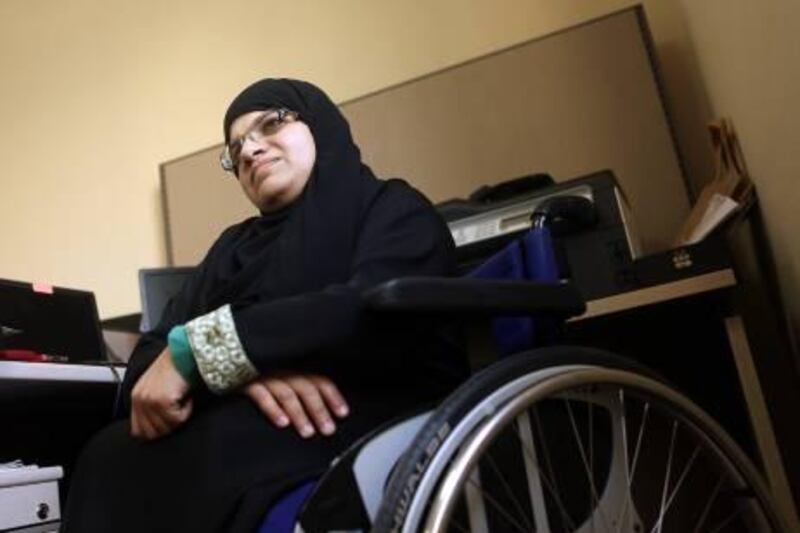DUBAI // Public transport is not the first option for the emirate's disabled, who rely on an expensive patchwork of private cars, buses and taxis, some specially equipped, to get around.
But a wider transport network with more connections could be a vital confidence booster for families of people with special needs as they explore other options.
Accessibility: How the requirements of people with special needs are being met
Last Updated: June 1, 2011
Drive for electric shopping carts in malls A Dubai woman is fighting for malls to provide scooters for their disabled customers. Read article
Travel eases with buses, shelters, taxis The Department of Transport is phasing out older buses in favour of accessible versions next year. Read article
School buses for special needs children in short supply The UAE has only 50 vehicles that can accommodate children with special needs, and each of those has just four such seats. Read article
The drive to include pupils with disabilities Education ministries in Abu Dhabi, Dubai and the Northern Emirates are focused on getting students with special needs into regular classrooms where they can thrive. Read article
[ More on services for disabled people in the UAE ]
Advocates for an upgraded system say change will be gradual, while authorities insist they are committed to making transportation friendlier for people with special needs.
"We live in a country where people have travelled for years by school transport, or by taxi, or are driven by their parents, so habits will not change immediately," said Wemmy de Maaker, director of Mawaheb, an art studio for special needs adults in Dubai.
There is a limited supply of buses for special needs students and the Dubai Taxi Corporation has just four vehicles fitted with lifts.
That leaves parents and caretakers to fend for themselves, said Gulshan Kavarana, head of the Special Families Support (SFS) group, which counts 200 families as members.
"I know parents who really struggle with it because these [special taxis] are booked out half the time," said Mrs Kavarana. "Most people don't know how long they will have to wait for a bus. And try pushing a wheelchair in the summer heat when it is 50°C."
Some parents are hesitant about allowing children with special needs to travel on their own - using the Dubai Metro or buses - and instead opt to take their kids to school or drive their spouses to work.
"My son wants to be independent, but as a mother I can't let him go alone," said Mansha Budhrani, of her 20-year-old son who has muscular dystrophy. "I have taken him on the bus and the Metro whenever he wants. He is happy because it's different from the car."
Sharan, a talented painter, is confident of going out alone though his legs are weaker than his arms. "He does mention that we should give him freedom to travel on his own," said Mrs Budhrani. "I guess ultimately the time will come when I will allow it."
The UAE's conservative culture also has an effect, said Nada al Bustani, a 40-year-old Emirati who was born with a disorder that caused leg deformities and requires her to use a wheelchair.
"A disabled person in Japan would be different from a disabled person in the UAE," she said. "There would be women who won't feel comfortable with public transport because of the mixing of men and women."
More awareness is needed so people with disabilities feel safe relying on public transport, she said. As a student in the United States, Ms al Bustani used trains and buses, but here she relies on her own driver.
"Taxi cabs here won't stop for a person with disability," she said. "There were instances when I had to take taxis in Dubai but I would ask someone to hail a cab for me and, in that case, the driver wouldn't know."
In February the Roads and Transport Authority (RTA) announced its plans to develop a comprehensive plan on accessibility. The Dubai Metro was built to be accessible and the city's 1,500 buses have ramps that can be lowered to the ground for wheelchair access, said Furat al Amri, the director of buses at RTA.
"Access for wheelchairs has become the standard now," he said. "Any new order we place for buses, it will have access for the disabled."
Yet last year, when the Ministry of Social Affairs conducted an attitude survey of 53 disabled people in Dubai last year, it found more than half had not taken public transport. Those who had, encountered a variety of issues including problems reaching the individual stations and bus stops.
"Thirty-nine per cent said they would use public transport only if it was accessible," said Nazem Fawzi, a disability adviser at the Ministry of Social Affairs involved in the survey.
Access to transportation is a necessary component for people with disabilities, said Victor Pineda, a disability rights advocate who was a visiting scholar to the Dubai School of Government in 2009/2010.
Some of the network's shortcomings were exposed last October, when the RTA invited a people with disabilities to test it.
Some stations were accessible, but others were hemmed in by streets that could not be crossed. At bus stops, people were faced with a hurdle getting on to the pavement, said Mr Pineda.
Among the recommendations from the exercise were for targeted education campaigns as well as larger lights on train exits, belts or restraints for wheelchair users, "tactile paths" inside the trains and metro staff who have been trained in sign language.
Some of those upgrades would require structural changes, said Abdul Redha al Hassan, the director of the RTA's rail planning and development department.
However, resolving problems outside stations requires co-operation between government agencie, said Nazim Mansour, an adviser at the Ministry of Social Affairs.
Essa al Maidoor, Dubai Municipality's assistant director for engineering and planning, said officials would co-operate to make the necessary changes.







